- Home
- Matt Hilton
Preternatural: Carter Bailey Book 1 Page 3
Preternatural: Carter Bailey Book 1 Read online
Page 3
A spark of attraction existed. Even blindfolded it would have been easy to recognise. It wasn’t anything we’d said. After all, little more than small talk had passed between us, and we hadn’t exactly flirted, but I definitely sensed a stirring of interest on both sides. Probably due to her line of work Janet had deliberately dressed down - you don’t wear Prada to dig holes - but beyond the plain façade she couldn’t conceal the natural beauty that had leapt out and gripped me the first time I looked at her. Something about the fullness of her bottom lip, the curve of her nose, the smoothness of her brow as I’d studied her in profile. Or, more probable, it was the way her eyes shifted from cool grey to sparks of rainbow when she laughed. Eyes do that for me. Whatever, I was hooked. I knew it without even the slightest attempt at self-analysis or psychobabble. I knew I was attracted to her the instant I saw the wedding ring and realised the twisting in my guts was jealousy.
Crazy. I had to be. My sole intention for coming to this God forsaken outpost wasn’t to search for Miss Right. Anything but. However, I couldn’t deny what my senses were telling me. Fanciful as it may sound, I know now that there is a greater power out there that rules the fickle lives of men. I know that every act we do, every thought, both kind and wicked has a purpose in the grand tapestry of the universe. Quite simply, I don’t believe in coincidence. I believe that things happen for a reason. Janet and I were destined to meet on that ferry ride, and that meeting held great portent for things to come. Good or bad. Sadly, considering my history, I couldn’t help but fear that events did not bode well for pretty Janet. The outlook, as they say, was grim.
So? I asked myself. Why was Janet attracted to me? Fair enough, as men in their late thirties go, I suppose I’m not too far gone that I can’t catch the eye of a woman any longer. Some women, I’ve heard, like their men to have a rough edge, so maybe my slightly misaligned nose and the scar over my right eyebrow adds to the attraction. I am moderately tall, another thing that some women go for, and I’ve kept myself in the best shape my nomadic lifestyle allows. But couldn’t she see that I was damaged goods? Couldn’t she detect the hurt in my eyes? The stoop in my shoulders from the weight of despondency I carried? More importantly…couldn’t she detect the monster that lurked within me?
“Feeling sorry for yourself, Carter? Now isn’t that unusual?”
I ignored the voice in my head.
As I rose from the bed I straightened the throw. No point in adding to the mess. By the single window was the en suite bathroom that the proprietor promised - a thankfully clean toilet bowl, a chipped porcelain sink, replete with dingy bar of scummy soap, and a mirror screwed directly to the wall. Hitching my chinos I stepped forward. I turned on the tap and listened to water straining its way through a system under demand from the lower floors. Finally, a weak trickle of water began pooling in the sink. I left it running, walked away to fetch my backpack and rummaged through it to find my razor. No hurry. By the time I was back at the sink, it was barely half full - or half empty depending on your outlook. I turned off the tap, tested the water: tepid at best. It would have to do. There was a film of salt on my face and hair courtesy of the ferry trip over. A shower would have been wonderful, but this sink was all that was available to me right then. Apparently there were communal showers in a separate building at the rear of the hotel, but I was in no mood for sharing my ablutions with a load of men smelling of fish guts.
In front of the mirror I stripped down to my chino’s, hanging my coat on an ‘artfully’ placed hook on the wall, but allowing my wrinkled shirt to fall at my feet and kicking it to one side. I turned on the tap again and found the water a little warmer. The mirror had been fixed in place with shorter guests in mind, probably for the bow-legged seamen of decades past, and I had to lean down to see my face. The patina beyond the glass didn’t aid my appearance any, made me look twenty years older. I didn’t look away. I continued to stare at my reflection, settling my gaze so it grew unfocussed, fuzzy. And in that state I could see him. Like staring into one of those Magic Eye puzzles. Whilst I was awake he only appeared to me when I was in that altered state. He was nothing more than a scarlet blur, but he was there. His cold eyes were as red as the rest of him, his red tongue flicking at the lobe of my left ear. Taunting. In a pointless gesture, I batted backwards over my shoulder. Of course, it had no effect on the mirror man.
“Give it a rest, Cash.”
Laughter. Not my own.
I snapped back to the here and now. Only my face stared back at me. Breath tore from me in a ragged exhalation. The tap had finally delivered a passable amount of warm water, so I twisted it off. Then I threw water over my face and hair. I again tasted salt. Threw more water. The cake of soap was just that; caked with someone else’s grime and bristles of grey hair. I nudged it into the water, actually hand washed the soap before I was reasonably happy enough to lift it from the water and lather it between my palms. I scrubbed the traces of my voyage from my face, my neck, down my chest, avoiding observing as best I could the progress of my hands. As ever, it was a pointless exercise. Standing, my chest was reflected in the mirror, and the suds did little to hide the crisscross of puckered scars that marred my body from collarbones to upper abdomen: my genuine reason for avoiding the communal showers.
“You’ve no appreciation for art.”
I concentrated on lathering up again. Patted the scummy suds onto my two days old beard, then used my razor to unveil a fresher face. Finished, I used the same water to clean the sink as it drained equally as slowly as it had taken to fill.
There were towels folded in a neat stack on a chair next to my bed. Surprisingly enough they were soft and smelled of fabric conditioner, and I supposed clean towels were in the domain of Mrs Proprietor whilst the remit of interior decoration was the realm of her less-discerning husband. But who knew?
In my backpack I had only the essentials. A couple of T-shirts, a pair of jeans, underwear, socks. Not the classiest wardrobe by any stretch of the imagination. I pulled free the black T-shirt, saw that it was less wrinkled than the green one, then shucked into it, stuffed it into my waistband. On went my damp boots. Then I ran a comb through my hair. Presentable enough, I decided.
My coat was wet, but I was a fatalist. It could only get wetter. I pulled it on. Left the room. I didn’t bother locking the door with the key on its kipper-sized fob that I’d been supplied with. I had nothing to steal. If anyone was desperate enough to need the meagre clothing and backpack, then they were in far greater need and welcome to them.
The stairs creaked beneath my weight. I could hear the tinny strains of a radio from one of the rooms a floor down, someone barking out a cough that spoke of a sixty-a-day smoking habit. The light was muted, but it wasn’t deliberate ambience, more the result of grime congealing on the lampshades. I steadied myself on a banister worn smooth by the passage of hands over more than two centuries, wondering about whose fingers had lingered where mine now passed. What memories the house could replay, what ghosts wandered its labyrinthine passages. My lips quirked at the memory of a previous visit to Paul Broom, the yellow ‘post it’ note fixed to his computer monitor, home of his tales of terror and imagination.
I’d read it out loud. “W.W.V.H.D.?”
Broom had glanced over his shoulder, offering a sly smile. “It’s a prompt,” he said. “For when I don’t know which direction to take the story.”
“Yeah? What does it mean?”
He shot me a cheesy grin. “What would Van Helsing do?”
I didn’t own a mobile phone, but found a telephone in the small dining room. There were no patrons, only the lingering odour of their meals, so the telephone was situated privately enough for my needs. It was one of those bulky cream affairs with large buttons and a slot to feed coins into: as ancient a relic as the rest of the hotel. I dropped fifty pence into a hollow-sounding receptor, even as I read the security advice that the phone was emptied daily. I jabbed buttons, listened to the electronic beeps and blips, then t
he sound of a ring tone that was echoed a bare two miles away.
“Verbalise.”
“Verbalise?”
“It means ‘speak’. I prefer ‘articulate’ but another author already holds the monopoly on that greeting.”
Frowning at the receiver, I said, “I’m on the island.”
“I know that.”
“I thought that might be the case.”
Paul Broom clattered something at his end.
Sounded like one of them old-fashioned football rattles. “Didn’t take too much deduction,” he admitted. “You called me to say you were boarding the ferry from Yell. The ferry didn’t sink. Ergo, you are now on Conn.”
“I could have jumped overboard,” I said.
“But you wouldn’t now be on a telephone to me, would you? Ergo - I say again - you are on the island.”
Our conversations were often as pointless as this. Light, stupid, harmless fun. Kept our minds off our real reason for verbalising.
“You want me to come on up to your place?” I offered.
“Good a place as any.”
“I’ll set off now.”
“Do you want me to come and pick you up?” There was no enthusiasm in his offer.
“No. I’ll walk.”
“It’s raining.”
“Helps clear the mind.”
Broom, one of only a few people who knew my secret, made a sound in his throat. “Yeah,” he concurred. “Maybe best you come with an open mind.”
And that was the end of our conversation. Not exactly value for money for my nice, shiny, pointy-edged coin.
I left the Sailor’s Hold without setting eyes on another living soul, stepped out into rain that wasn’t any heavier than when I’d done the ferry crossing, but it was a whole lot colder now that the night had settled in. Up went the collar of my coat. I stuffed my hands in my pockets. There was only the one main street. Didn’t matter which way I headed, the road led around the tiny harbour town in both directions, picked up spurs that went up and over the cliffs behind Skelvoe, then joined the coast road that circumnavigated the island. If I went to the right, it was a marginally shorter trek to the coast road. I turned left. Call me Mr Gauche; I don’t care. The longer I walked the more head clearing I could do.
Having previously studied a Google Earth image of the island, I knew that Broom’s rented cottage lay two miles to the northwest. But that was as the crow flies. If I followed the coast road north, then cut across the island on a feeder route, it made the journey almost three miles. Much of that was at a steady elevation, too. A good work out, even without the extra burden of carrying around sodden clothing. But I was up to the challenge; choosing to walk, I suppose, is another of those penances I’ve frequently set myself in order to redeem my failure.
My walk took me past more harbour front hotels, a couple of which appeared less run down than the Sailor’s Hold, but also a couple that held even less appeal, and I came to the conclusion that I hadn’t done too poorly out of my choice. A post office-cum-general store was in darkness, as were a few other shops and, to my surprise, a tiny branch of WH Smiths. No Marks and Spencer, though. The remainder of the harbour side buildings was privately owned dwellings and workshops. A couple of alleys led on to side streets, but I didn’t venture into them. I followed the main route where it passed between a fishing tackle shop on one side and a bank on the other, then found that it swung to the right and climbed steeply. Mid-way up the hill I was looking down on the rear of the harbour buildings, whilst to my left smaller houses climbed the hillside like disarrayed rows of packing crates. At the top, the road continued to the right, and I wandered along the narrow pathway, blinking the rain out of my eyes. From this high vantage I could see the red, blinking lights from the submarine tracking base way off on the horizon. Four or five miles of rugged terrain separated us. At the spur road I again lost sight of the masts. Here a bulwark of stone jutted high in my vision, forcing the harsh angle the road took. I continued on along the road, a brief respite from the rain afforded by the sheltering rocks. At the coast road the rain returned with a vengeance. I was once more in open country, not even a shred of shelter offered by the stunted bushes hugging the roadside. Connor’s Island was about the bleakest of bleak. There was the occasional sparse tree, uncommon this far north, but most of the indigenous flora was in the way of short, tough grasses, moss and a spiny form of bracken I couldn’t identify. There were no street lamps. There wasn’t even a moon in the sky to light my way. There was nothing in the sky but the slanting rain that twinkled like slivers of broken glass.
I didn’t care. I wasn’t afraid of the dark. There are far worse things to fear than the insubstantial shadow of night.
I plodded along for perhaps half-an-hour, found the road that cut across the island. During my march I cleared my mind of all outward influences, got into ‘The Zone’, as they say. I put out of mind that which had haunted me these past four years. Even his constant murmuring subsided to the faintest of buzzing in the far reaches of my senses. Cassius’s voice was quieter than the patter of rain on my head, inconsequential. I was actually beginning to enjoy my walk.
Then I saw the headlights.
A single set of them about a quarter-mile ahead. In reflex I glanced down at my wristwatch. The fluorescent dial showed me it was twenty past nine. Not exactly late, but around here, in this weather, who would be out driving unless they had to be? Only one answer: conscientious copper. I sighed because I knew what to expect.
Sure enough, as the vehicle approached it slowed down. Paying it no mind, I continued walking, head down, hands fisted in my pockets. The car came to a halt beside me. When I was a kid, police cars were predominantly white with a central red band. We called them ‘jam sandwiches’. This vehicle was more akin to a lime marmalade sandwich where the filling had erupted in all directions. Still, it remained a police car. I continued walking, feeling the eyes scrutinising me from within. The gumball lights came on, followed by the short bleat of a siren. I stopped, gazed unconcernedly back at the car. Rather than climb out of the car where it was, the driver reversed so that it was again level with me. I leaned down as the policeman inside cracked open his window.
“Evening officer,” I offered.
“Evening.” The cop was older than me, with sandy hair, freckled features, and thick around the neck and shoulders. Next to him was a woman, fifteen or twenty years his junior, but it was her who wore the stripes on her shoulders. I wasn’t surprised to see two officers; in Scotland police always come in twos: due to that corroboration of witnesses thing that doesn’t apply to English or Welsh law.
“What can I do for you?” I tried for amiable, without concern. The way I hoped any innocent person would react to being stopped by the police.
“We don’t get too many people walking way out here at this time of night.” The policeman’s accent was of the islands; similar to that I’d heard spoken in the hotel. “Especially on a night such as this.”
I did the old look up at the sky, blink of confusion, shrug and lift of the palms, the rain’s not that heavy, kind of thing.
“Where are you going?” It was the sergeant. Her tone was lighter, more lilting in its pronunciation, more Scottish lowlands. I placed her as hailing from Ayrshire, or maybe Dumfriesshire.
“I’m going to a friend’s place,” I said.
“What’s your friend called?”
“Paul Broom.”
The constable said to his sergeant, “Is that no’ the writer out at Mrs McClure’s place?”
She glanced over at me for confirmation. I shrugged. “I’ve never heard of Mrs McClure, but, yes, Paul’s a writer.”
“He’s quite famous, too,” the constable noted. The sergeant nodded in agreement. The man said, “What’s your name, then?”
I told him. He said, “Date of birth, please. And your home address.”
I told him those details, too. He leaned down and started punching buttons on an in-car computer. As remo
te as the island was, I didn’t believe they’d be in touch with a dispatcher based here - probably over on the mainland - but they weren’t short of the technology to keep tabs with the rest of the world. Probably had to be hi-tech due to the presence of the submarine tracking base being situated here. Blue light pulsed from the screen as the readout of my personal stats came back. Clean.
“Any warrants out on you?”
I shook my head. “No. But you can check, if you want?” He was going to anyway. A few more buttons were pressed. The cop sniffed, almost as if he was disappointed.
“Got any identification on you?”
I didn’t complain. I was used to this. Kind of comes with the territory when you move around a lot. Doesn’t help when your accent denotes you ‘not of these parts’. I have to admit, though, even this was a bit of a record for me. I’d barely been on Conn three hours and already I’d attracted the eye of the law. I scratched in my back pocket, pulled out my wallet and fished out my driver’s license. I handed it to the officer and he scrutinised it as though it was an original Dead Sea Scroll. Sniffing again, he passed it back to me.
“All appears in order,” he said, more for the sergeant’s sake. She didn’t answer. She was staring at me. I stared back. Her pupils dilated and her gaze flicked away.
The policeman handed me my license. “Thanks,” I said, returning it and my wallet to my pocket. “Is it okay if I get going again? Like you said, it’s not the best weather to be out walking.”
“We can give you a lift,” the man said. I looked to the sergeant, saw her eyes dart to mine, flick away again. She didn’t seem keen on the idea.

 The Girl on Shattered Rock: A gripping suspense thriller
The Girl on Shattered Rock: A gripping suspense thriller Collision Course
Collision Course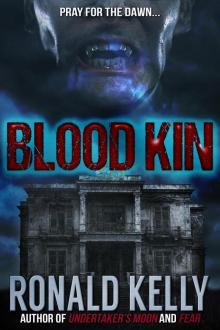 Blood Kin
Blood Kin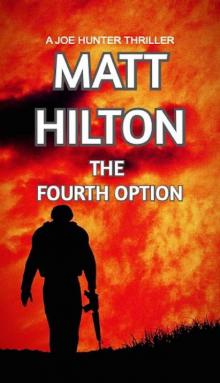 The Fourth Option
The Fourth Option Hot Property: A Joe Hunter Short Story
Hot Property: A Joe Hunter Short Story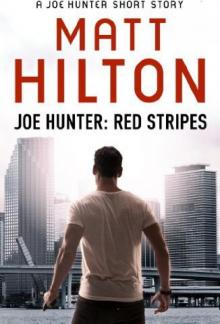 Red Stripes
Red Stripes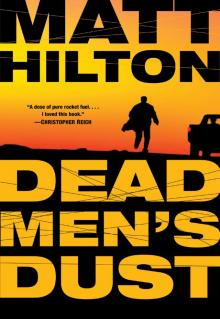 Dead Men's Dust
Dead Men's Dust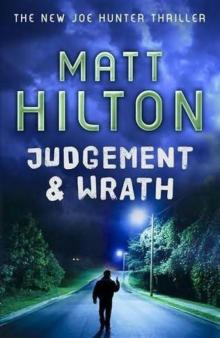 Judgement and Wrath
Judgement and Wrath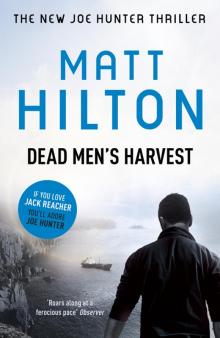 Dead Men's Harvest
Dead Men's Harvest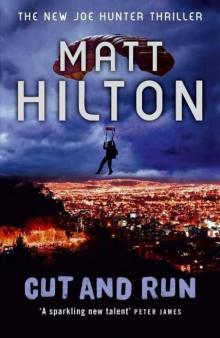 Cut and run jh-4
Cut and run jh-4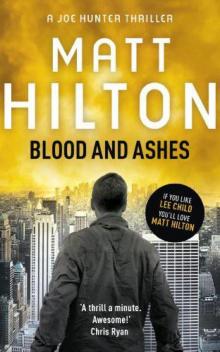 Blood and Ashes jh-5
Blood and Ashes jh-5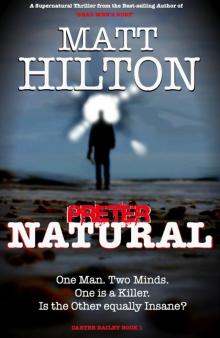 Preternatural: Carter Bailey Book 1
Preternatural: Carter Bailey Book 1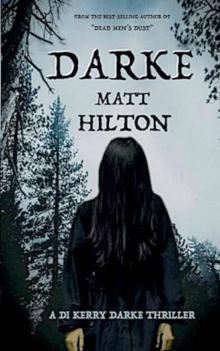 Darke
Darke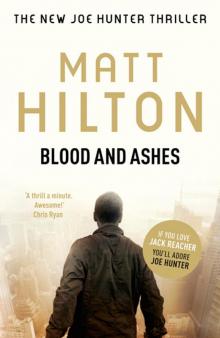 Blood and Ashes
Blood and Ashes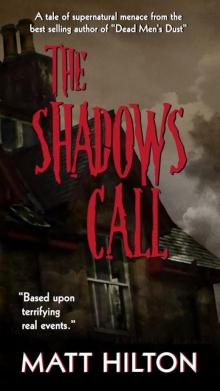 The Shadows Call
The Shadows Call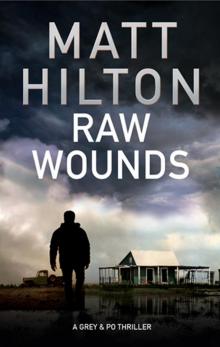 Raw Wounds
Raw Wounds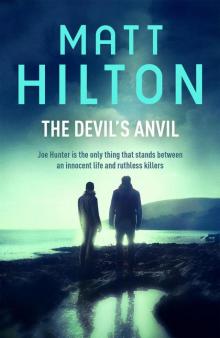 The Devil's Anvil
The Devil's Anvil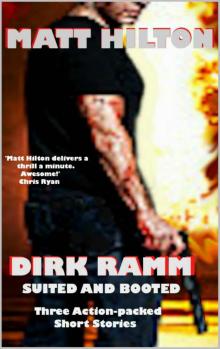 Dirk Ramm: Suited and Booted
Dirk Ramm: Suited and Booted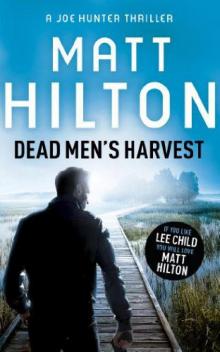 Dead Men's Harvest jh-6
Dead Men's Harvest jh-6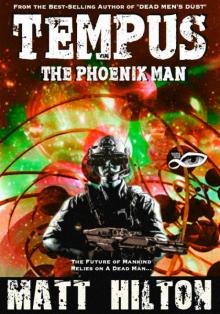 Tempus: The Phoenix Man
Tempus: The Phoenix Man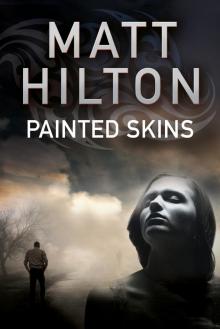 Painted Skins
Painted Skins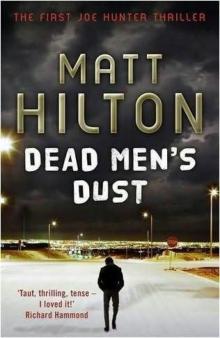 Dead Men's Dust jh-1
Dead Men's Dust jh-1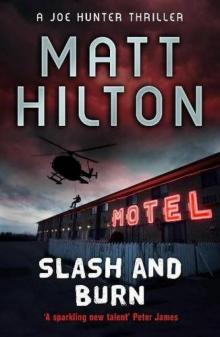 Slash and burn jh-3
Slash and burn jh-3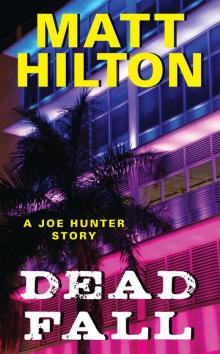 Dead Fall
Dead Fall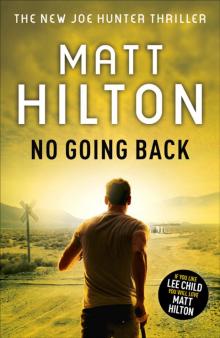 No Going Back - 07
No Going Back - 07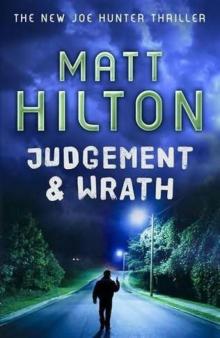 Judgement and Wrath jh-2
Judgement and Wrath jh-2